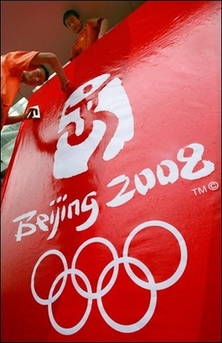Internet deal triggers cyber storm
Updated: 2007-10-23 16:21
BEIJING - Competition in China's booming Internet sector has turned sour ahead of the Beijing Olympics, with Sohu.com upsetting its rivals through a lucrative sponsorship deal that is now being challenged.
 Workers install a billboard advertising the 2008 Olympic Games in Beijing, 07 August 2007. [Agencies]
|
The Chinese portal paid a reported US$30 million in 2005 for the rights to set up the Games website for the Beijing Olympics organising committee and to use the logo of the event -- the signature silhouette of a dancing man.
However it has since put the squeeze on rivals by claiming the deal included exclusive rights to host all the advertising by Beijing Games sponsors bearing the official logo.
This would give Sohu.com an effective Internet monopoly on ads by firms such as Adidas, Volkswagen, Johnson and Johnson and Bank of China, and its rivals are fuming.
The organising committee's legal department is now working to untangle the affair that could determine who gets millions of dollars in advertising revenue between now and the August Games.
It could also give an invaluable boost in the broader Internet advertising sector, which marketing analysts iResearch believes will be worth more one billion dollars this year, up nearly 40 percent on 2006.
Sohu.com said its rivals feel they cannot allow the firm to gain an edge through its Olympic deal.
"In China the Internet industry is very tough and the competition will do whatever it can to fight this deal because they know it's a big one," said Chen Luming, Sohu.com vice-president and chief of its Olympic business division.
He said that Olympic sponsorships were tailored to exclusivity, which accounted for the growing success of the marketing programme of the International Olympic Committee (IOC) and of the Beijing organising committee, known by its initials BOCOG.
But Internet sponsorship is a new category, introduced for the Beijing Olympics for the first time, and the exact extent of the rights enjoyed by the holder have yet to be clearly defined, according to BOCOG.
"Our legal department is still working to determine what is exclusive and what is not," said Niu Wei, an official in BOCOG's media and communications department.
China's other major portals have formed an alliance against Sohu.com to fight the exlusivity claim and say they plan to put together Internet content for the Games and sell ads around it.
Zeng Fuhu, general manager of portal business at Tom.Com, a major rival of Sohu.com, said the case was clear cut.
"They have paid to get the rights to set up the official website of the Games and we are okay with that," he said. "They get to use the logo as well but anything beyond that is bogus."
Zeng says he should know. He worked for Sohu.com as business department director before defecting to Tom.Com two years ago. One of his projects at Sohu.com was the Olympic deal.
"The claim about exclusivity on advertising has no basis... It would be like saying that all Olympic sponsors in the US would have to put their TV ads on NBC."
The network is the official US television rights holder with exclusive rights to cover the Olympics.
An IOC official told AFP that Sohu.com's sponsorship deal should not guarantee the portal "exclusive or special editorial or advertising rights on their website in relation to the Beijing Games."
However, BOCOG has yet to issue a ruling, while sponsors have been left in the dark.
"We have had no directive from BOCOG about advertising on the Internet," said Zhou Yi, general manager of China Mobile, a Beijing Olympic partner.
|
|
|
||
|
||
|
|
|
|